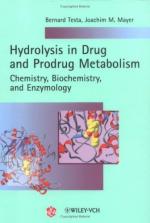|
This section contains 568 words (approx. 2 pages at 300 words per page) |

|
Hydrolysis is a chemical reaction in which water reacts with another substance to split it into two or more new substances. Examples include the conversion of starch to glucose in water under the action of a suitable catalyst; conversion of sucrose to fructose and glucose in water in the presence of an acidic or enzyme catalyst; conversion of fats into fatty acids and glycerol in water in soap manufacture; and reactions of dissolved salts in water to form various products. Hydrolytic reactions are important in many biochemical processes, particularly in enzyme catalyzed reactions such as those used in digestion.
In each reaction, a water molecule separates into H+ and OH-, and the compound being hydrolyzed splits into two fragments, A+ and B-,where AB represents the original compound. The products of hydrolysis are AOH and HB. If, for example, ordinary sodium chloride (table salt) is placed...
|
This section contains 568 words (approx. 2 pages at 300 words per page) |

|


